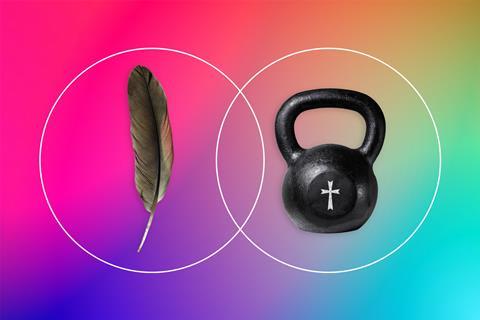Kate Orson talks to four women of unbelieving husbands about the challenges of encouraging faith in their children

Coming to Christ later in life can be a little tricky if you are already married with children. How can you teach your children about God in an ‘unequally yoked’ relationship? A non-believing partner might object, and while marital harmony is important we must also follow the Lord. When you suggest church to your child on a Sunday your partner might have tempting counter offers like shopping or brunch at a bakery. Sometimes it feels like competing against the entire world to keep the faith.(see a piece about celebrating Christmas here.)
The Bible says to ‘Train up a child in the way he should go; even when he is old he will not depart from it.’ (Prov. 22:6) This is tricky when your partner is not in agreement. I spoke to four mothers about the challenges they have faced.
Into atheism
Ailie Baumann, is a Christian counsellor. She married a Christian who gradually moved into atheism. ‘’It took me 10-11 years to accept who he was, and that he was the man who God asked me to marry, even though I never foresaw that this would be my life. Now it doesn’t bother me that he’s not a Christian. I can honestly say I’m enjoying our marriage.’’
While it hasn’t always been easy, Baumann’s husband respects her faith, and her original intention of bringing up their children in a Christian household. When they were younger she did Christian homeschool and the children went to church. She says,‘’As they got older, the older two didn’t want to go anymore. I felt I had to respect their choice. And I had to respect where my husband stood. I didn’t force it otherwise that would be religion. Now it’s become more about creating a space, they know they can ask questions, and they will get answers.’’
Not keen
Kirsten came to Christ after a difficult period in her marriage. She knew her partner wasn’t keen on Christianity, and she felt called to prioritise marital harmony, with a more stand-back approach. She says, ”Jesus didn’t force anyone to believe in him. Each person has their own choice.’’ What’s interesting is that both children have started religious studies classes at school with a strong emphasis on Christianity. She answers her children’s questions, and helps with their studying. Kirsten feels as if God has his hand in their lives, creating opportunities for conversation without her preaching.
Godly habits
Marina has young children, and co-parents with her ex. partner. She says, ”Jesus is an integral part of our lives. He’s embedded into our lives in everything we do. We pray before food, at bedtime we talk to God, and we pray and read our Bible. They know these things because we practise them every single day.”
Issues can arise when her co-parent undermines her parenting. Marina says, ” my children tell me, ’Daddy says God isn’t real’ or ’Daddy says, what about dinosaurs?’ He sometimes complains that it’s unfair that I get to raise them up in my faith. It’s difficult because he wants to focus on making money, and having fun. I want to raise my children up to know God. It’s a polar opposite, and that can be quite confusing for my children. But I think they understand my views more as there is a solid basis for them. We practise the same thing every day so there’s stability there.”
How not to do it
Lisa spoke to me about what not to do, after she left new age spirituality to become a Christian. ”Coming from the new age I feel we know the dangers of certain occult items, books and TV programmes, more than maybe some other Christians. Because of that I was too hardline with them, and it was difficult because I didn’t have my husband to back up my choices. I tried to stop them reading Harry Potter, or telling them that certain music was bad. It hasn’t helped draw them towards Jesus.’’
Marina agrees, ‘’I made a huge mistake being very forceful at the start, trying to change all the things my ex. partner enjoyed. I wish I had tread more gently. But I truly believe God uses all things and I learnt so much from my mistakes. It taught me to do everything with grace and love.”
A common thread in all the conversations I had, is that it’s not just about the practical choice of whether or not we go to church, or read the Bible to our children. It’s about trusting God. Baumann says, ”I have been meditating recently on the scripture, ‘the righteous shall live by faith.’ I’ve often heard that verse in line with salvation, that it’s not by works we are saved but through faith, and God’s just really pressed on my heart that this means doing all things by faith. The righteous shall do marriage by faith, the righteous shall parent by faith.”
It may seem more difficult to teach about Christianity in an unequally yoked relationship but we can give our heavy burden to God. We can let go of the need to act from a fleshly desire to change things and trust that the Holy Spirit will offer us opportunities to share when the time is right.







































